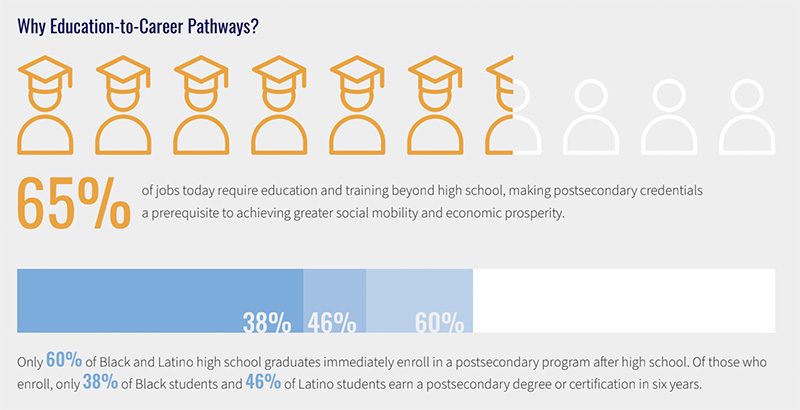Allan: With $175G Grants, Accelerate ED Looks to Better Link K-12, College & Work
'Design sprint' in 12 states seeks to give more high school students a path to a valuable credential and early career success by 'year 13'

Get stories like this delivered straight to your inbox. Sign up for The 74 Newsletter
Twenty years ago, the Bill & Melinda Gates Foundation sponsored an effort to redesign high schools to enable more students to graduate on time prepared for a college or a career. Many of these programs were designed to give students access to the “Three Rs” — Rigor, Relevance and Relationships — which often took the form of introducing college-level classes and career academies to provide real-world learning opportunities and connections with adult role models and mentors. What we learned is that high schools can provide early access to higher education in ways that incorporate work-connected learning to the benefit of students.
Today, most states require high school students to complete a set of defined courses, assessments and experiences in order to graduate on a career-ready pathway. However, the number of schools that fully embrace coherent programs of study that connect K-12, higher education and employment remains frustratingly small. Inspired by some innovative partnerships making these connections, the Bill & Melinda Gates Foundation asked: What would it take for every high school student to have the opportunity to earn credits to complete an associate degree one year after high school while gaining valuable experience and career preparation in a field of interest — at little to no cost?
Today, we’re proud to launch Accelerate ED: Seamless Pathways to Degrees and Careers with teams in 12 states that will receive grants to build on existing efforts so more high school students will have a path to a valuable credential and early career success by “year 13.” Each team includes key stakeholders across K-12, higher education, employers and youth-focused community-based organizations. Together, these promising cross-sector initiatives will seek to blur the boundaries among high school, college and work in ways that support students in finding and staying on a path to economic mobility as young adults.
Studies on effective practices across early college, career and technical education, and dual-enrollment models show strong evidence of impact on student outcomes, including increases in high school graduation, college enrollment and degree attainment. Yet, opportunities for high school students to make significant progress toward a degree while gaining valuable real-world work experience remain unevenly distributed. Research reveals that many first-generation college students, students of color, English learners and students with disabilities, among others, do not have access to these programs, and even when they are available, myriad rules and practices — such as high-stakes placement tests for eligibility — keep many students from pursuing these paths.
The pandemic compounded these gaps, triggering alarming decreases in attendance and college enrollment. Many students, particularly those from low-income communities and communities of color, dropped out of school to take jobs to support their families.
Now is the moment to invest in bridges across K-12, higher education and the workforce to bring high school, college and career pathways into tighter alignment and counter those damaging trends. Each Accelerate ED team will each receive a $175,000 grant to expand its existing programs and learn from one another over the course of a six-month “design sprint.” While their specific approaches will vary, they will share common design principles, such as seeking innovative instructional models to make these programs more accessible for students and considering creative ways to attract funding to sustain this work and ensure ongoing affordability for future classes of students.
Teams will set shared goals for which experiences and opportunities all students should have in grades 9 to 13 and identify innovative ways to expand on what works: access to robust counseling and advising, career-connected learning and a coherent set of advanced courses that span high school and college programs of study, linked to a credential valued in the local labor market.
The aim of the Accelerate ED initiative is to create exemplars that show that with clear commitment, strong partnerships and structured supports, all students can successfully transition from high school to college to work. For example:
- Early College Promise in Massachusetts aims to offer high school students underrepresented in higher education the opportunity to attain an associate degree or 60 credits toward a four-year degree in a state-approved Early College Promise program. Participants will defer high school graduation and take a full load of college courses while receiving high-quality wraparound supports from both the high school and college.
- 13th Year Pathway to Career Success in Dayton, Ohio, is designed to provide clear avenues for students toward in-demand jobs in health care, information technology and manufacturing. Students who earn a certain number of college credits in these fields by 12th grade are automatically accepted into a 13th year to complete an associate degree and are guaranteed acceptance to a four-year university to complete their bachelor’s degree. Through this grant, Ohio leaders will expand this approach beyond Dayton to all 16 districts in the region.
- Scalable Success in Texas is working to update the P-TECH model (Pathways in Technology Early College High Schools) to enable students to complete an associate degree by their 13th year. Using several existing P-TECH campuses as a guide, this grant will support development of a blueprint for how similar high schools across the state can offer a 13th year model and identify key policies and funding options to make these programs available to many more students in the region and across the state.
As the economy recovers and the nation transitions out of the pandemic, the time is right for an ambitious effort to realize the vision of the last 20 years — not as a special early college program for a few deserving students, but as a set of clear pathways that connect all students to opportunities through innovative partnerships and approaches. We are excited to support the Accelerate ED innovators in creating pathways to opportunity that every student deserves.
Sara Allan is director of education pathways and early learning for the Bill & Melinda Gates Foundation
Disclosure: The Bill & Melinda Gates Foundation provides financial support to The 74.
Get stories like these delivered straight to your inbox. Sign up for The 74 Newsletter

;)
